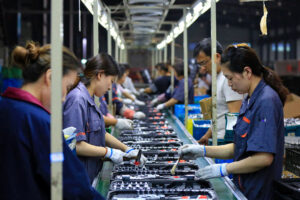By Justine Irish D. Tabile, Reporter
THE PHILIPPINES could be in position to benefit from the tariffs the Trump administration is promising to impose should the incoming government in Washington choose to selectively support its strategic partners, a US logistics company said.
In an interview with BusinessWorld, C.H. Robinson Vice-President for Southeast Asia Stephen Ly said favorable tariff treatment by the US could cause companies to relocate their manufacturing hubs outside of China, with Southeast Asia likely to be favored.
“I think this trend will continue with the new US administration coming along as more tariffs lead to more diversification,” Mr. Ly said.
He said that although it is hard to predict what the Trump administration will do, any change will bring opportunity.
“You have to look at the bright side. I think the Philippines, with its close ties to the US and with how the defense pact has created more jobs, I think manufacturing and all that will follow,” he said.
“To what extent? It will really depend on the current government’s policies, willingness to reduce red tape, and all that. Ultimately, all businesses are looking for a business-friendly environment,” he added.
He said that the Philippines could play a big role in the semiconductor supply chain due to the geopolitical tensions between China and the US.
“The Philippines has a very established semiconductor industry. Technology and computer chips have been one very big contentious point between the US and China,” he said.
“We’ll be seeing some of our customers in that space shift their manufacturing capacity into the Philippines. So with that and Southeast Asia being a manufacturing hub, you are going to see more companies like us serving the logistics needs of these customers,” he added.
He added that the same factors could boost manufacturing segments like auto parts.
“Auto parts are big, as are sub-assembly, circuits, and electronics. It really comes down to the Philippines having a very young and highly educated workforce,” he said.
“Traditionally, I think, that kind of worker went into business process outsourcing (BPO), but certainly, I think with the shift to manufacturing, there is going to be more opportunity in manufacturing,” he added.
He said that in order to support the manufacturers entering the country, the Philippines will need to improve its infrastructure.
“As manufacturers come here, we need better roads, ports, and airports, to support exports,” he said. “There’s no point having manufacturing here if you don’t have the infrastructure to support the exports.”
Regarding Customs, he said that the Philippines could improve its processes by digitizing further.
“I firmly believe that we need to move to a more electronic environment, as that will speed things up, reduce red tape, and ease the facilitation of trade,” he said.
“The Philippines is not the worst in this region … so I believe with enough investment and time, this will continue to evolve to be much better. Twenty years ago, the Philippines didn’t have the systems it has now,” he added.
He said that disruptions caused by seasonal events like typhoons “can be managed,” though the Philippines’ archipelagic nature makes it logistically challenging.
“You have over 7,000 islands. If you are not coming from a major city, just to ship inland to a major port is a challenge to the contractor,” he said.
However, he said such concerns are not unique to the Philippines.
“If the Philippines were to reap the benefits from the shift in manufacturing from China into Southeast Asia, as have Vietnam and Indonesia; if you get those investments, the government can invest in infrastructure,” he said.
“What I would say is that the future for Southeast Asia and the Philippines looks very bright. For companies like us, C.H. Robinson, we have a lot of confidence in the Philippines; that is why we invested here,” he added.
